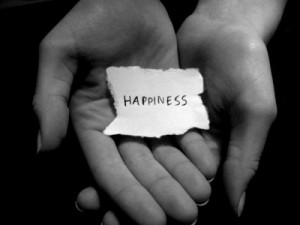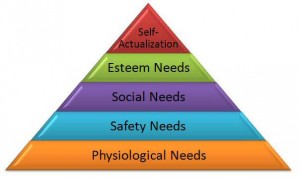By Chris Brady
 “Don’t make that face! It might freeze that way!” It’s a silly little thing parents say to kids. We’ve all heard it. Even as children we knew it wasn’t true. But now I’m aging and I realize something profound: it was true! There are lines in my face representing the most dominant facial expressions
“Don’t make that face! It might freeze that way!” It’s a silly little thing parents say to kids. We’ve all heard it. Even as children we knew it wasn’t true. But now I’m aging and I realize something profound: it was true! There are lines in my face representing the most dominant facial expressions
I’ve been making all these twenty-nine years, and from the looks of it, I’ve been spending a lot of time making a lot of faces! I guess I should have listened.
Wouldn’t it be nice if the inevitable aging process instead froze smile lines on our faces; if our most dominant facial expression indicated happiness and contentment? To me, it seems, that’s precisely what most people wish for. In fact, throughout my life,
I’ve noticed that one of mankind’s highest aspirations is to “Be Happy.” If you observe how people behave, they do a lot of what they do in order to make themselves feel happy. I’ve had more people than I can remember tell me, “I just want to be happy.”
The strange thing is, however, that most people seem to be terrible at predicting what will make them happy. They chase after this thrill, or that one. They rearrange their lives around a new job, a new challenge, a new relationship, a new hobby, or a new anything else.
It’s this next thing that’s going to make them happy. “As soon as” they:
- get into college
- get out of college
- get married
- get divorced
- have kids
- have the kids move out
- make it to the weekend
- go on vacation
- get out of debt
- get that promotion
- get that recognition they think they deserve
- get that new car
And the list goes on. But how often does the attainment of the items on this list actually make someone happy? How often are people right about that next thing producing happiness in their lives?
Answers to these questions have launched researchers on quests for many decades. There is even a strange sounding “Science of Happiness” category in which behavioral “experts” dig into the components of happiness. Predictably, however, these experts can’t come to an agreement on just what comprises happiness and what produces it over the long term.
There are many interesting theories.
One theory posits that happiness is like Maslow’s Hierarchy of Needs. Like a pyramid with the most essential elements such as food, air, water, rest and sleep at the bottom, once those needs are met the next level is safety, including shelter, security, protection, and stability.
Once those needs are met the next level is love and belonging, comprised of family and friend relationships. Higher still is self-esteem which includes achievement, status, and responsibility. The top is the high-sounding self-actualization, which is made up of fulfillment, self-sufficiency, creativity, morality, and authenticity. Ascending this pyramid supposedly makes one more happy.
Another theory says we are happy when we have the perception of control over events, paired with a noticeable amount of progress in our endeavors, along with a connectedness to others, and finally with a vision toward something of higher meaning than ourselves.
Still another one gives the memorable phrase, “Someone to love, somewhere to go, and something to do.”
Yet another says happiness comes from three levels; pleasure, passion, and purpose. Purpose being the most important, pleasure the least.
Aristotle said, “happiness is the only thing men desire for it’s own sake,” meaning, everything men desire they desire because they think it will produce happiness. They are all secondary pursuits to the main goal: happiness.
Happiness, as indicated by the wide range of theories and humongous amount of focus placed upon it by seemingly everyone, is important to us. It is behind nearly everything we do. It drives us, motivates us, and dictates our behavior. It’s just that it is mostly beyond us. We cannot obtain it from direct pursuit.
So how do we obtain happiness?
Whenever I forget all about my own happiness and get committed to helping make others happy, I find that happiness boomerangs around back to me. On the contrary, when I do things to make myself feel happy directly, at best, they are fleeting moments of shallow happiness, not the lasting, deep, meaningful happiness for which our hearts truly yearn.
And that brings me to my point, the making of which I trust will bring you happiness, but perhaps not as much as when I bring this article to an end! Nonetheless, I bring you to this: happiness, despite all the indicators and theories and focus, is not our true goal. We only think it is.
Blaise Pascal, the seventeenth century French mathematician, philosopher, inventor, and all-around smart guy, once said:
“There is a God shaped vacuum in the heart of every man which cannot be filled by any created thing, but only by God, the Creator, made known through Jesus.”
When I got what I thought I wanted, I found out I didn’t really want it. All the while the answer was there before me. I had been created by a loving God and was built to find my rest in Him. I could run, I could hide, but my heart would bear me out: there was no happiness in the things I thought would make me happy. There was nothing but theories and the next thing to pursue.
I can’t write about happiness without unmasking it for what it is: a fickle flirt. Happiness is a temporary feeling that comes and goes. It teases us into wasting our time and energies toward its attainment, when all along It is not our highest aspiration, though we may think it is.
What we are truly seeking is deeper and more permanent than happiness: what we are truly seeking is something called Joy. It is not a synonym for happiness, but rather the actual article for which happiness is a mere impostor.
It is the true object of our hearts, and as Pascal states so eloquently, it can only be found through a personal relationship with Jesus Christ. In that condition, our existence makes sense, our heart finds its true longing, our soul finds its rest, and our whole being is flooded with the joy that only He can give.
Joy doesn’t come and go based upon circumstances. It doesn’t rely on a situation or outcome. It is deep, permanent, divine, and lasting. It is also what we’ve been searching for all along.
*******************************
 Chris Brady co-authored the New York Times, Wall Street Journal, Business Weekly, USA Today, and Money Magazine best-seller Launching a Leadership Revolution.
Chris Brady co-authored the New York Times, Wall Street Journal, Business Weekly, USA Today, and Money Magazine best-seller Launching a Leadership Revolution.
He is also in the World’s Top 30 Leadership Gurus and among the Top 100 Authors to Follow on Twitter. He has spoken to audiences of thousands around the world about leadership, freedom, and success.
Mr. Brady contributes regularly to Networking Times magazine, and has been featured in special publications of Success and Success at Home. He also blogs regularly at Chris Brady.
He is an avid motorized adventurer, pilot, world traveler, humorist, community builder, soccer fan, and dad.






Speak Your Mind
You must be logged in to post a comment.